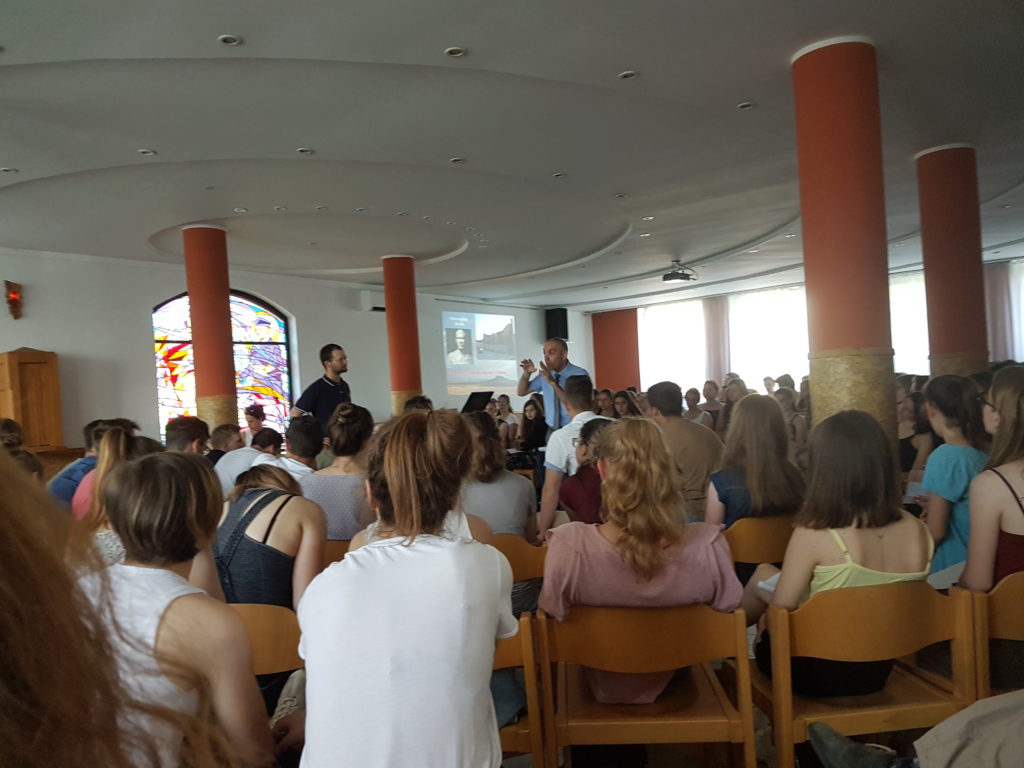Sharing experiences and teaching has always been a hobby of mine. I had the chance to be invited by the Jesuits Refugee Service to hold some lectures about Syria and the refugee crisis for Hungarian high school groups. I liked the idea for many reasons: Syria is small country in the Middle East, which not many people in Europe had heard about until the 2015 refugee crisis. The problem is that most of the media only shows negative stories about Syrians and refugees – yet, Syria has a deep history and rich civilization! This has motivated me to participate in these school visits to talk about Syria’s history, culture and importance which a lot of people are not aware of.
Although I am not a refugee, I can be a first-hand witness of many things that happened in Syria and know a lot of Syrian people make this decision and venture out of the country. The school visits were very interesting, because I’ve met so many enthusiastic students who were interested in knowing about Syria, and asking questions about things they’ve heard or read somewhere, and wanted to know if they were true. I’ve presented many historical facts, and received many interesting questions such as: have you faced any discrimination being a Syrian in Hungary?
These visits made me realize that European people don’t know much about the Middle East, even though it’s the cradle of civilization and Christianity, and I think such cultural visits are important and helpful to make Hungarian students more aware of international issues and help them see things from different angles.
Hungarian version
Új nézőpontok
Mindig is egyfajta hobbiként tekintettem a tanításra, illetve arra, hogy megosszam a saját tapasztalataimat másokkal. Így amikor a Jezsuita Menekültszolgálat meghívott, hogy vegyek részt a CHANGE projekt alkalmain, több okból is elvállaltam: Szíria egy kis közel-keleti ország; Európában ritkán hallottak róla egészen a 2015-ös menekültválságig. Azóta a média általában negatív képet mutat a szírekről és a menekültekről általában, pedig Szíriának évezredes történelme, gazdag kultúrája, és nagy történelmi jelentősége van, amiről sajnos kevesen tudnak. Ez motivált, hogy beszéljek a szír kultúráról és történelemről a magyar középiskolásoknak.
Nem vagyok menekült, de közvetlenül tapasztaltam, ami Szíriában történt az elmúlt években; és tudom, hogy miért döntött sok szír amellett, hogy elhagyja az országot. Az iskolai foglalkozások során azt tapasztaltam, hogy a diákok nyitottak, szeretnének többet tudni Szíriáról; és éltek az alkalommal, hogy most első kézből kaphatnak válasz az őket érdeklő kérdésekre (hogy csak egy példát említsek: ért-e valaha diszkrimináció engem Magyarországon élő szírként?).
Azzal is szembesültem, hogy bár a Közel-Kelet a civilizáció és a kereszténység bölcsője, itt Európában sokszor csak nagyon keveset tudnak róla az emberek. Úgy gondolom, hogy az ilyen találkozások nagyon fontosak, hiszen segítenek a diákoknak abban, hogy egy új szemszögből lássák a világot.

